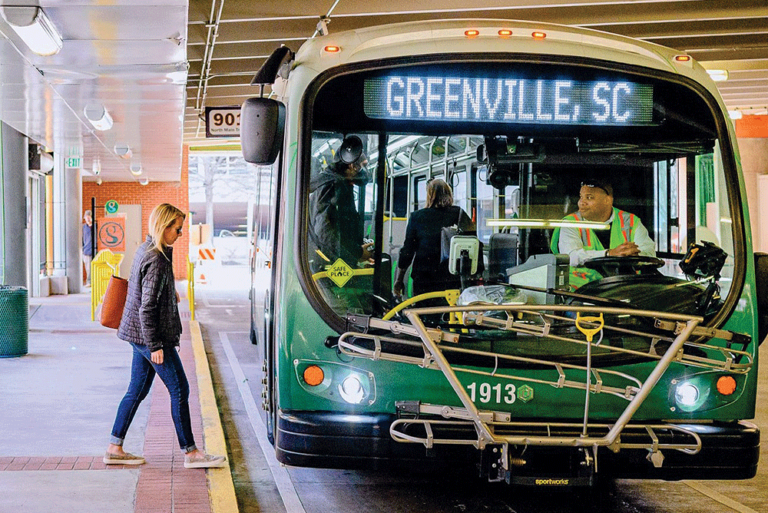Greenville, SC, is a Green City
Creating a sustainable future is a top priority in the region.

Greenville, SC, is living up to its name as a “green” city, as government, business and nonprofits work toward a more sustainable future for the region and its citizens.
In February 2023, the City of Greenville officially adopted a new plan that puts sustainability at the forefront.
Dubbed “Sustainable GVL,” the plan was created in partnership with Furman University’s Shi Institute for Sustainable Communities to help with research, along with the city’s Green Ribbon Advisory Committee, comprised of Greenville residents with sustainability interests, such as environmental lawyers and recycling advocates.
Since adopting the plan, the city has started public sustainability education through social media and created a dedicated full-time city staff manager position focused on sustainability, a role occupied by Hannah Slyce.
Slyce’s responsibilities include working with other city departments, primarily focusing on sustainable land use decisions.
“From my understanding, I am in one of the only positions in the Upstate that is dedicated solely, in a local government, to sustainability.”
Hannah Slyce, City of Greenville
Good for Business
Greenville is thriving when it comes to the electric transportation sphere. Electric vehicle and battery technology manufacturer Proterra, for instance, opened a new EV battery manufacturing center in nearby Greer in late 2022, putting the community on the map as a leader in EV manufacturing.
The company has also operated an electric bus manufacturing center in Greenville since 2010.
“They’ve played a really big role in the electrification of our bus fleet,” says Slyce of Proterra. “It’s a good example of the economy being a push for sustainability.”
Sense of Community
Slyce notes that Greenville is home to a number of nonprofits dedicated to sustainability. One such nonprofit is Sustaining Way, a local organization focused on caring for people and the environment, specifically in historically marginalized communities.
On a day-to-day basis, Sustaining Way does quite a bit in partnership with other local businesses – from offering an energy home visit program and an active steward youth program to providing education through its own backyard garden. In the long term, however, the nonprofit hopes to create an accessible sustainability model that can be implemented in other communities.
Sustaining Way has a main hub called Annie’s House in the Nicholtown community of Greenville, serving as a model for sustainable living, an education center, a sustainable practice demonstration site and home to the nonprofit’s backyard garden. The organization has also started working with two new communities, New Washington Heights and Brutontown.
“The idea that we operate off of is that sustainability shouldn’t be a privilege, and it isn’t just a privilege, but is often treated as such,” says Sustaining Way’s Sydney Spires. “For instance, teaching someone about sustainable energy usage in the home isn’t just good for the planet, it can also help save money, which can be vital to people paying bills.”
In all of this work to build a more sustainable Greenville, the voices of citizens are being prioritized. “Community engagement is what we try to incorporate in everything,” Slyce says.
In fact, community engagement is one segment of the six-pronged Sustainable GVL plan, in addition to climate and energy, the built environment, air and water, transportation mobility, and goods and services.
Sustaining Way also considers it a vital part of its mission to connect with communities.
“We have a position of engagement coordinator who has built a lot of personal connections with the community. The point of that role is really to make those relationships and have hands-on connections.”
Sydney Spires, Sustaining Way
Feed & Seed
Another nonprofit benefiting the region is Feed & Seed Co., which, in 2022, opened in Judson Mill to buy crops and other products from local farmers, then provide the fresh food to the Greenville County community.
Judson Mill is a former textile plant that operated from 1910 to 2005, with the 800,000-square-foot mill sitting on 34 acres along Easley Bridge Road in rural Greenville County. Feed & Seed does business in an 18,000-square-foot former warehouse where mill cotton was stored before it went to the threaders.
“We make our money by running a market and a café that both open Tuesdays through Saturdays from 8 a.m. to 5:30 p.m.,” says Mary Hipp, Feed & Seed board chair. “We are a nonprofit, so I also do a lot of writing to ask for grants.”
Feed & Seed does business with farmers from 10 Upstate counties, and the organization has a staff of 20 employees. Hipp says she could easily hire 10 more people if she had the funding.
“We are also part of the FoodShareSC program that helps pack boxes to feed families in need,” she says. “This company does a lot of positive and innovative things from our location, which is why we call our warehouse a Food Innovation Hub.”
Hipp says Judson Mill was chosen largely because of its location in a rural part of Greenville County designated as a food desert. A food desert is an area where a large number of individuals and families live a long distance from a grocery store.
“Our market, café and Innovation Hub perform a great service so that people can eat healthily, locally and happily,” she says. “They can get local produce, meat, dairy, honey, coffee and housemade take-and-bake meals, and also available is breakfast and lunch.”
Kevin Litwin contributed to this article.
Get to Know Greenville, SC
Want to learn more about living and working in Greenville, SC? Check out the latest edition of Greenville — Live here. Love here. Career here.


